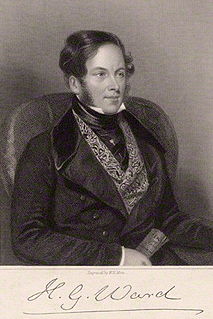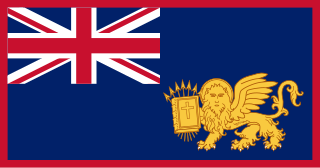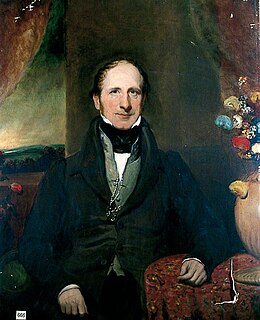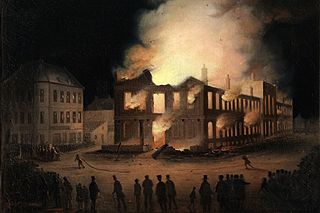Related Research Articles

Viscount Downe is a title that has been created twice in the Peerage of Ireland. The first creation came in 1675 for William Ducie. However, the title became extinct on his death in 1679. The second creation came in 1680 for John Dawnay. He had earlier represented Yorkshire and Pontefract in the English House of Commons. His son, the second Viscount, also represented these constituencies in the House of Commons. His grandson, the third Viscount, sat as a Member of Parliament for Yorkshire but died from wounds received at the Battle of Campen in 1760. He was succeeded by his younger brother, the fourth Viscount, who represented Cirencester and Malton in Parliament.

Sir Henry George Ward GCMG was an English diplomat, politician, and colonial administrator.

Richard Le Poer Trench, 2nd Earl of Clancarty, 1st Marquess of Heusden, styled The Honourable from 1797 to 1803 and then Viscount Dunlo to 1805, was an Anglo-Irish peer, a nobleman in the Dutch nobility, and a diplomat. He was an Irish, and later British, Member of Parliament and a supporter of Pitt. Additionally he was appointed Postmaster General of Ireland, and later, of the United Kingdom.

The United States of the Ionian Islands was a Greek state and amical protectorate of the United Kingdom between 1815 and 1864. The successor state of the Septinsular Republic, it covered the territory of the Ionian Islands, as well as the town of Parga on the adjacent mainland in modern Greece. It was ceded by the British to Greece as a gift to the newly enthroned King George I.

James Archibald Stuart-Wortley, PC, QC was a British Conservative Party politician and the husband of the philanthropist Jane Stuart-Wortley.

Sir George Strickland, 7th Baronet, also known as Sir George Cholmley was an English Member of Parliament and lawyer. He took the name Cholmley to succeed to the Cholmley estates in 1865.
Events from the year 1797 in Great Britain.

Robert Smith, 1st Baron Carrington, was a British banker and politician who sat in the House of Commons from 1779 to 1797 when he was raised to the peerage.

George Stevens Byng, 2nd Earl of Strafford, PC, styled Viscount Enfield between 1847 and 1860, of Wrotham Park in Middlesex and of 5 St James's Square, London, was a British peer and Whig politician.

William Bulkeley Hughes J.P. was a Welsh politician who sat in the House of Commons from 1837 to 1859 and 1865 to 1882. He was elected for Member of Parliament for Carnarvon Boroughs constituency.

The burning of the Parliament Buildings in Montreal was an important event in pre-Confederation Canadian history and occurred on the night of April 25, 1849, in Montreal, the then-capital of the Province of Canada. It is considered a crucial moment in the development of the Canadian democratic tradition, largely as a consequence of how the matter was dealt with by then co-prime ministers of the united Province of Canada, Sir Louis-Hippolyte Lafontaine and Robert Baldwin.
Raikes Currie was Member of Parliament (MP) for Northampton from 1837 to 1857. He was a partner of the bank Curries & Co, along with his father, Isaac Currie, in Cornhill, City of London, and had several interests in the newly developing colony of South Australia. He restored Minley Manor and made substantial improvements to the estate, work which was continued by his son and grandson.
Chase Price was a British lawyer and politician who sat in the House of Commons between 1759 and 1777.
Sir James Law Lushington was a British Member of Parliament and Director of the East India Company.
Admiral Robert Honyman was a Scottish admiral in the British Royal Navy who served in the French Revolutionary Wars and in the Napoleonic Wars. A native of Orkney, he also held office for ten years as a member of parliament (MP) for Orkney and Shetland.
Lieutenant-General Hon. John Meade CB was an Irish officer in the British Army. After leaving the professional army he served as a militia officer in Ireland, and sat in the House of Commons of the United Kingdom for twelve years before taking up a diplomatic post.

Hannah Courtoy, born Hannah Peters, was a London society woman who inherited a fortune from the merchant John Courtoy in 1815. Her distinctive Egyptian-style mausoleum in London's Brompton Cemetery has been the subject of considerable curiosity and speculation ever since a report by Reuters in 1998 repeated claims that it contained a working time machine.

Richard Godson, QC (1797–1849) was an English barrister and politician. He was member of Parliament for St Albans in 1831–32 and then Kidderminster 1832–34 and 1837–1849. His father was William Godson of Worcester who died in 1822. His brothers were Septimus Holmes Godson, barrister, and Stephen Godson, attorney. Godson's relationship with Kidderminster began when he defended carpet-weavers on trial there in 1830. In 1835, following the abolition of slavery, Godson received compensation for enslaved persons associated with the Pusey Hall Estate in Jamaica. He had declared this "embarrassment" openly while campaigning, during which time he supported both the First Reform Bill and emancipation.
William Godson was an attorney in Tenbury, Worcestershire, and elected one of the county's coroners in 1809.

Robert King, 2nd Earl of Kingston was an Anglo-Irish peer. He was styled Viscount Kingsborough between 1768 and 1797.
References
- ↑ "Barristers Called. Michaelmas Term, 1837." The Legal Observer, Vol. XV, No. 438, p. 170.
- ↑ Attested copy of the will of William Godson of Tenbury (Worcs). National Archives. Retrieved 26 December 2015.
- ↑ Peter Davis (2013). The Diary of a Shropshire Farmer: A Young Yeoman's Life and Travels 1835-37. Amberley Publishing Limited. p. 209. ISBN 978-1-4456-2573-7.
- ↑ Commons, Great Britain Parliament House of (1841). Accounts and Papers of the House of Commons. Ordered to be printed.
- ↑ GODSON, Richard (1797-1849). History of Parliament. Retrieved 26 December 2015.
- ↑ Westminster Marriages Transcription. findmypast. Retrieved 25 December 2015. (subscription required)